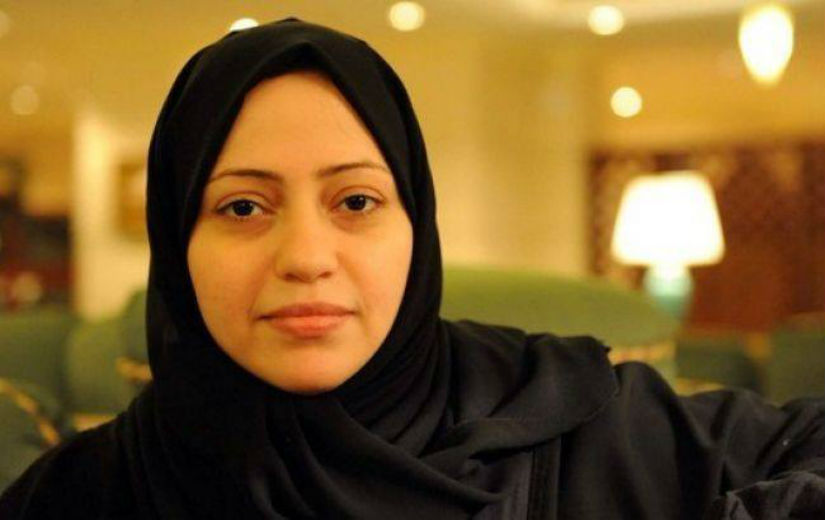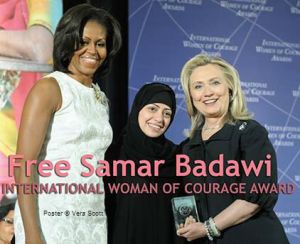Samar Badawi, the wife of Waleed Abulkhair and sister of Raif Badawi, was arrested this week in Saudi Arabia and charged with operating Waleed’s Twitter account. She was released the same day.
The arrest was reported in every major mainstream news publication within an hour of it breaking, and every human rights organization posted updates about Samar’s arrest through these last 48 hours.
She published a statement on her Facebook account this morning:
“Thanks for those who asked, worried, express solidarity or tried to help and find a solution during my imprisonment.
“I also would like to thank whoever dealt with me nicely in the Criminal Investigation Unit, Alsalama Police Dept, in Thahban prison or in the Bureau of Investigation.
“Outspokenly, the new Thahban prison is clean and run professionally and I hope it will continue that way. But after all, prison is prison and nothing equals freedom. Be free. 🙂 “
(The smile emoticon is Samar’s.)
A bit more background, and then below, some thoughts that I am starting to develop on what all of this means and why an American ought to care.
Waleed is Raif Badawi’s lawyer as well as his brother-in-law, and he is in prison for his human rights advocacy as well. Samar Badawi and Ensaf Haidar (Raif’s wife) are two of the bravest people. (I am lucky to say that both Ensaf and Samar have sent me personal words of encouragement in publicizing Raif’s story on this web site and for writing about human rights issues in Saudi Arabia.)
Samar has been an activist like her brother for years (both are in their early 30s). As a teenager, she fought for the right of women to leave abusive families, even as her father filed charges against her time and again; then she fought for women’s suffrage; then she was a part of the campaign to get women driving in Saudi Arabia. The U.S. State Department honored her with a Woman of Courage award in 2012.
Ensaf Haidar left Saudi Arabia with her three children in 2012 and human rights advocates helped her find a home in Quebec, Canada. She and the children have been building a life there, learning English and French, while Ensaf has traveled the world making people aware of her husband Raif’s story, his words, his life.
Samar remained in Saudi Arabia with her children, and like Ensaf, she did not lay low but instead continued the peaceful fight for human rights that she and her husband always supported with words and actions. Saudi Arabia revoked her passport last year, which is never an indication of good things to come.
Elham Manea, who is an advocate for Ensaf and Raif, Tweeted this:
Utterly unwise: With arrest of #Samar_Badawi, current Saudi leadership is shutting the door in the face of those demanding reform peacefully
— Elham Manea (@ElhamManea) January 12, 2016
Some thoughts. This arrest is a troubling one, and I stand by my interpretation that it is an indication that the hardliners in Saudi Arabia are feeling that they are winning control in their nation, whether or not they are. They had to know that the arrest of as prominent a figure as Samar Badawi would attract worldwide outrage and condemnation, as it did. They want the world to know that they do not care about such things. Saudi Arabia’s actions so far in 2016 are more than a mere signal of what the rest of the year will hold for citizens in that nation.
The hardliners inside the Saudi split are busy publishing rumors through their American and British media connections that a rift between hardliners and “Westernizers” is rending the monarchy asunder. One emerged just today that King Salman is about to be deposed after a hospitalization or that he will resign soon in favor of his hardliner son. The reports claim that he has dementia. They want us to believe this. (The Intercept has been publishing a great series of articles about the Saudi public relations machine in America recently. The takeaway is if you are reading Politico, the Wall Street Journal, or watching any of the Sunday morning news discussion programs, trust that when Saudi Arabia is a topic, all of the experts brought in for quotes about the nation are paid representatives of the Saudi public relations effort in America.)
There is a rift, and it is more complicated than a simple one between hardliners and “Westernizers.” Oil prices are low right now and much of Saudi Arabia’s oil is under the Eastern Province, where Qatif is, the city that the executed Sheikh Nimr was based. The population of that province is Shia and Saudi Arabia is a Sunni majority nation. As an oppressed minority, Shia in Qatif have protested and Sheikh Nimr was a peaceful leader.
Iran is across the Persian Gulf from the Eastern Province and it is a majority Shia nation. That religious schism is the origin of the enmity between those two countries, which flared into public rage after Sheikh Nimr’s execution, but it goes deeper and is more recent than that; religious differences are what each country points to as a matter of emotional convenience and crowd control.
Since 2010, Saudi Arabia has cut deals to purchase more than $90 billion worth of fighter jets, missile defense systems, equipment, and expertise from American arms manufacturers. These are the public deals. We like to keep our customers happy. Our customer was not happy about our participation in signing the international treaty with Iran last year. (Why do all the Republican candidates for President decry that deal? They have 90 billion answers.) Our customer wants us to see the world through its own bipolar lenses, itself versus Iran and us versus Russia, and it wants our reassurances that we do.
Saudi Arabia wants us to leave it alone while it attempts to silence anyone in its nation who thinks freely and expresses it. Anyone who has the audacity to speak. It has given us 90 billion reasons, after all.
More on all of this later. For now, I am simply happy that Samar Badawi is safe tonight.
____________________________________________
Follow The Gad About Town on Facebook! Subscribe today for daily facts (well, trivia) about literature and history, plus links to other writers on Facebook.
Follow The Gad About Town on Instagram!

This work is licensed under a Creative Commons Attribution-NoDerivs 3.0 Unported License.


Thank you for writing about this. I just read an in-depth article on the rights of women in Saudi Arabia (or lack thereof) in last week’s New Yorker that definitely highlighted my ambivalence at how the U.S. conducts its relations with the Kingdom. I understand the reasons behind them but it’s tough to approve when you see, on a daily basis, how human rights are patently violated.
LikeLiked by 2 people
Thanks for sharing. I read yesterday that Samar Badawi has dual US-Saudi citizenship. doesn’t that mean she still has got a US passport and shouldn’t she get out or to a US embassy asap, with a small as well? My thoughts and non-religious prayers are with her and the Badawi families in any case.
LikeLiked by 1 person
She is relatively safe; she sent a thank you note to me this morning on FB for posting this column. But I am with you 100% in thinking safety may lie elsewhere for her and her children. Getting Waleed and Raif free is at the top of her mind, I think. Thank you for reading this and taking the time to comment–Mark
LikeLike
thanks for getting back! good to hear that you are in contact with Samar Badawi. Of course, nobody can make her decision for her or even judge hers! I just wonder whether even like Raif’s wife, she may be able to do more from overseas towards freeing the men? Thanks for writing.
LikeLiked by 1 person
S.A. has blocked Samar from traveling abroad for a year and a half or so now. In a circumstance like this, a passport is of no use, and even having a citizenship awarded to you from another country (Canada has given Raif Badawi citizenship, or at least that nation’s equivalent of green papers) is a nice thing to have, because it means that there will be welcoming arms when you arrive, but if the country of origin won’t allow you to leave in the first place …
And at this point, in the rancid anti-foreigner atmosphere in my country right now, I don’t know how much good having U.S. citizenship does for Samar.
LikeLiked by 1 person